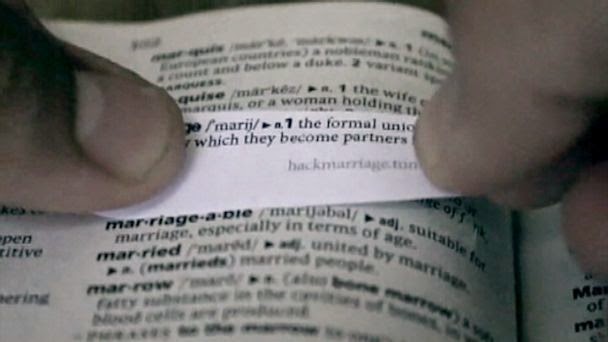The War On The Word "Marriage"
Excerpt from: The War On The Word 'Marriage' By: Robin Phillips
Changing the definition of marriage from the conjugal understanding to the revisionist understanding was an important goal of the same-sex lobby, but it was not its main goal. The primary objective was the normalization of same-sex relationships through legal and societal recognition. Changing the definition of marriage (first implicitly and then explicitly) was both a means to this end and a by-product of it.
One of the reasons it was so easy to impose the revisionist understanding on both America and Britain is because the groundwork had already been laid in the middle of the last century when marriage ceased to be understood as organically connection to procreation. When you’ve been treating marriage as little more than a romantic relationship between two persons for about 60 years, it becomes difficult to really appreciate why gender dimorphism or complementarity is essential rather than accidental to marriage. Even so, this should not minimize the significance of the fact that the revisionist definition is now being formally imposed.
But does this really matter? Why should we be concerned that dictionaries are changing the definition of marriage, as long as we know what we mean by it?
We should be concerned because the way we define words change how we think about each other and the world itself. Neuroscientists and cognitive psychologists are discovering that speech does not merely proceed from our thoughts like a one-way street—there is also traffic flowing in the other direction. How we speak affects how we think about the world on a level that our conscious minds may never even be aware.
Consider the different views of humanity subtly implicated by describing a baby as a “fetus” versus calling it “a human being created in the image of God.” Or even consider the implication of calling a baby an “it,” as I just did in the last sentence. While these alternative ways of talking about a baby may be equally true on a purely factual level, they convey an entirely different sense.
Lera Boroditsky, professor of psychology at Stanford University, has noted, “[T]he structures in languages (without our knowledge or consent) shape the very thoughts we wish to express.” Boroditsky has shown that even the parts of speech that we take for granted, like how we conjugate verbs, can play a subliminal role on how we perceive the world and other people. Similarly, in his bestseller Outliers, Malcolm Gladwell explored how the way we speak from infancy has an effect on how we view the world. In his book The Brain that Changes Itself, Norman Doidge took this even further by showing that the way we speak alters the actual neurocircuitry in our brains. Nicholas Carr echoed this in his book The Shallows, demonstrating that throughout history the way we communicate alters how we perceive the world on a precognitive level. James Davison Hunter summed it all up in his book To Change the World: “Language, the most basic system of symbols, provides the primary medium through which people apprehend their conscious experience in the world.”
What these and many other scholars are trying to help us realize is that language doesn’t just describe what we think about the world, it is also a lens by which we understand and interpret the world around us often without even realizing it.
Consider the different views of humanity subtly implicated by describing a baby as a “fetus” versus calling it “a human being created in the image of God.” Or even consider the implication of calling a baby an “it,” as I just did in the last sentence. While these alternative ways of talking about a baby may be equally true on a purely factual level, they convey an entirely different sense.
Lera Boroditsky, professor of psychology at Stanford University, has noted, “[T]he structures in languages (without our knowledge or consent) shape the very thoughts we wish to express.” Boroditsky has shown that even the parts of speech that we take for granted, like how we conjugate verbs, can play a subliminal role on how we perceive the world and other people. Similarly, in his bestseller Outliers, Malcolm Gladwell explored how the way we speak from infancy has an effect on how we view the world. In his book The Brain that Changes Itself, Norman Doidge took this even further by showing that the way we speak alters the actual neurocircuitry in our brains. Nicholas Carr echoed this in his book The Shallows, demonstrating that throughout history the way we communicate alters how we perceive the world on a precognitive level. James Davison Hunter summed it all up in his book To Change the World: “Language, the most basic system of symbols, provides the primary medium through which people apprehend their conscious experience in the world.”
What these and many other scholars are trying to help us realize is that language doesn’t just describe what we think about the world, it is also a lens by which we understand and interpret the world around us often without even realizing it.
That is why we should be concerned about the uncritical acceptance of the new revisionist definition of marriage throughout English-speaking culture. It isn’t just a matter of semantics, but it involves an entirely different understanding of relationships, family, and even what it means to be human.
To read more on this subject:
Why Words Are Powerful And Why They Matter
Why Popular Talking Points Obstruct the Gospel From Homosexuals

Comments